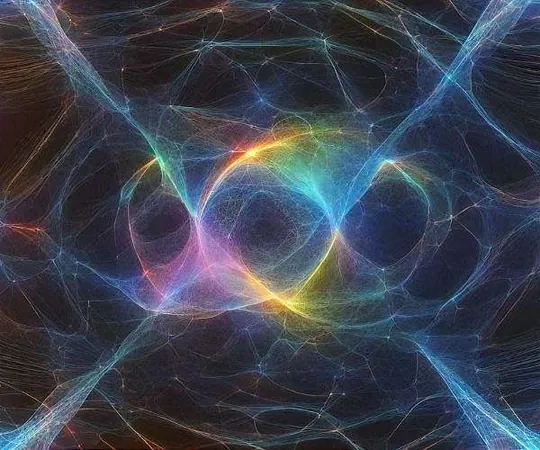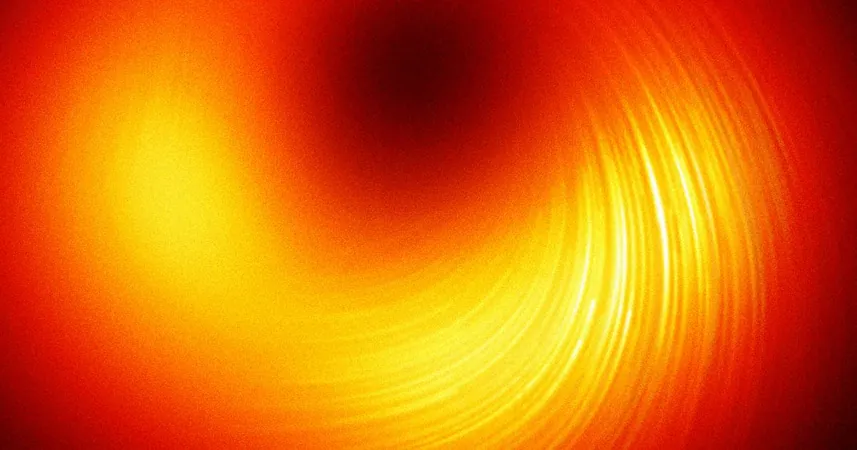
Is Dark Energy Just a Cosmic Mirage? New Research Challenges Long-Held Beliefs About the Universe's Expansion
2024-12-22
Author: Amelia
Revolutionary Study Questions Dark Energy
A revolutionary study from the University of Canterbury in New Zealand has thrown a wrench into the long-standing understanding of dark energy, a key component in the cosmological model that describes the acceleration of the Universe's expansion. This research, revealed in a recent paper published in the Monthly Notices of the Royal Astronomical Society Letters, suggests that dark energy may not exist at all. Instead, the Universe's expansion could be much more irregular and complex than previously thought.
Challenging Long-Standing Beliefs
For over a century, scientists believed that the Universe expanded uniformly, with dark energy providing the necessary explanation for the acceleration observed in distant galaxies. However, the team led by Professor David Wiltshire posits a different scenario. Their findings support the "timescape" model, which attributes the variations in the rate of expansion to gravitational influences on time itself, rather than relying on an enigmatic anti-gravity force like dark energy.
Professor Wiltshire elaborated on the implications of their results, stating, "We do not need dark energy to explain why the Universe appears to expand at an accelerating rate. In reality, dark energy is likely a misidentification of variations in expansion's kinetic energy in a Universe as unevenly structured as ours."
The Timescape Model
Central to the timescape model is the phenomenon of gravitational time dilation, where time passes at different rates depending on the gravitational field. In lower-density voids of space, time is believed to flow faster than in regions filled with galaxies, resulting in the illusion of an accelerated expansion in those sparsely populated areas. This reinterprets existing observations without the need for dark energy.
Challenging the CDM Model
This new perspective challenges the prevailing Lambda Cold Dark Matter (CDM) model, which has been the cornerstone of modern cosmology, relying heavily on dark energy to align observations of supernovae with the Universe's accelerating expansion. Recent data, however, has raised doubts about this model. The so-called "Hubble tension" highlights discrepancies between the early Universe's expansion rate—determined from the Cosmic Microwave Background radiation—and the current observed rate.
Evidence Against Constant Dark Energy
Adding fuel to this scientific fire, the Dark Energy Spectroscopic Instrument (DESI) has revealed evidence suggesting dark energy may not be a constant, contradicting the core principle of the CDM framework.
"The current structure of the Universe is an intricate web of galaxy clusters and voids," continued Professor Wiltshire. "A simplistic approach based solely on Einstein's general relativity may not suffice to explain the complexity we observe."
Future Observations
To validate the timescape model further, high-precision observational data will be paramount. The European Space Agency’s Euclid satellite and NASA’s upcoming Nancy Grace Roman Space Telescope are primed to provide crucial insights, with the Euclid project particularly requiring over 1,000 high-quality supernova observations to test the differences between the timescape and CDM models.
Building on Earlier Studies
This research builds upon earlier studies from 2017, in which timescape was shown to marginally outperform the CDM model. Through collaboration with the Pantheon+ team and the analysis of 1,535 different supernovae, the Canterbury researchers now claim to present "very strong evidence" in favor of the timescape model.
Looking Ahead
"With the advent of new observational data, we might unravel the Universe's most profound mystery by the end of the decade," concluded Professor Wiltshire, hinting at the exciting possibilities that lie ahead for both cosmology and our understanding of the Universe.
As scientific inquiries continue to unravel cosmic enigmas, we may soon confront a reality that fundamentally reshapes our comprehension of the cosmos. Stay tuned, as these revelations could upend everything we think we know about the fabric of space-time itself!









 Brasil (PT)
Brasil (PT)
 Canada (EN)
Canada (EN)
 Chile (ES)
Chile (ES)
 España (ES)
España (ES)
 France (FR)
France (FR)
 Hong Kong (EN)
Hong Kong (EN)
 Italia (IT)
Italia (IT)
 日本 (JA)
日本 (JA)
 Magyarország (HU)
Magyarország (HU)
 Norge (NO)
Norge (NO)
 Polska (PL)
Polska (PL)
 Schweiz (DE)
Schweiz (DE)
 Singapore (EN)
Singapore (EN)
 Sverige (SV)
Sverige (SV)
 Suomi (FI)
Suomi (FI)
 Türkiye (TR)
Türkiye (TR)